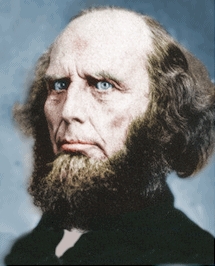Get Today in Masonic History into your Inbox. Sign up today for one of our email lists!
Need an article for your Trestleboard/Newsletter see our Use Policy
Charles Grandison Finney Passes Away

Today in Masonic History Charles Grandison Finney passes away in 1875.
Charles Grandison Finney was an American clergyman.
Finney was born on August 29th, 1792 in Warren, Connecticut. Shortly after his birth, his family moved to Jefferson County in upstate New York. Finney never attended school. He read law. Prior to passing the bar, a dramatic conversion and baptism into the Holy Spirit led him to give up his legal practice and preach the gospel.
Starting 1825, Finney became active as a revivalist. He preached around New York State, including in Manhattan. He also preached in the Broadway Tabernacle. His sermons often included women praying out loud, which was uncommon at the time. He also created the "anxious seat." Those considering converting to Christianity, sat in it, to receive the prayers of the congregation.
Finney took part in the abolitionist movement. He moved to the free state of Ohio, where he worked with the Underground Railroad. There he preached against slavery from the pulpit.
In 1835, despite having no formal education himself, Finney became a professor at Oberlin College. In 1851 he became president of the college. Under his tenure, Oberlin was the first college in America to admit black students as well as women into the school.
Finney passed away on August 16th, 1875.
Finney was a member of Meridian Sun Lodge No. 32 as a young man. After his conversion he decided to leave the fraternity because he felt it was in opposition to Christianity. He later was active in the Anti-Masonic movement.
This article provided by Brother Eric C. Steele.

